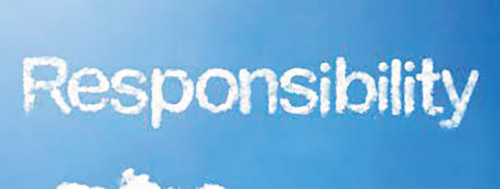
“It’s Daniel’s fault! I didn’t do anything!” These are words teachers often hear in their classrooms. Responding to these accusations from the child is more critical than one would think. How should one properly respond to this behavior? How does a teacher process the situation without getting frustrated that the child is absolving himself of all responsibility?
Children (and adults) have a hard time taking responsibility for their actions. We learn in Parshas Bereishis that when Adam was confronted about his transgression after eating from the tree, he avoided responsibility for his sin, first shifting the blame to Chava and ultimately Hashem for giving him his partner in crime. Children often find a similar “exit” to their behaviors by blaming circumstances and others as the reason that they behaved in that manner.
Throughout Tanach, we find stories of those who have taken responsibility and have been immeasurably rewarded and those who did not and lost out. Yehuda took responsibility for his actions with Tamar and he was rewarded by being the forefather of Moshiach. David Hamelech took responsibility for his actions, while Shaul Hamelech did not. David retained his power as king and Shaul lost the throne for his family. The question a teacher has to ask themselves when observing children deflecting, is how to convey to them properly that they need to own up to their infractions. By doing so, the teacher will help children gain a life skill that will help them become productive, reliable and accountable adults.
Larry Thompson in his book “Roadmap to Responsibility, states, “Schools have evolved greatly in the areas of curriculum, assessments and instructional strategies, but educators, administrators and counselors can feel stuck in the past when it comes to addressing student behavior.”
Unfortunately, new strategies have not been implemented when it comes to student behavior. Thompson points to the fact that many studies over the years for school reform have shown that the major aspect that helped student performance and behavior was teachers “seeing learning through the eyes of students and helping them become their own teachers.” The famous parable of a teacher being a guide on the side as opposed to the sage on the stage is very much applicable when it comes to student behavior. Thompson argues that it is our mission in a school to teach the children real-life skills, such as taking responsibility for their behaviors. This, he believes, will allow our children to be upstanding citizens in the world and be able to have the knowledge to work along with other people in any environment.
How does one teach children to take responsibility? Thompson uses responsibility-centered discipline (RCD) and the “Give ’em five” methods. The five pillars include: Support, Expectations, Breakdown, Benefit and Closure. When talking to a child after a negative behavior, one should be focused on how to help the child recognize that they need to take ownership for what they did wrong. The author argues that giving the child a supportive statement will allow the child to recognize that you are being sincere and really want to help them make a change. In addition to a supportive statement, the child should be aware of what the expectations are in order for them to know how they should be behaving.
Breaking down the negative behavior is the third aspect of the RCD method; this is breaking down the behavior for the child and explaining to them what they actually did wrong. Benefit is a statement given to the child in order for them to recognize why it’s beneficial to change and work on their behavior. Finally, Closure is when you ask the child what they need to do in order to rectify this situation, thus, putting the onus on the child to think about how they would like to take responsibility.
When working in school it is important to recognize that our ultimate goal in chinuch is not just for the students to retain the information and be able to master a subject area. It is important for us to teach the next generation life skills that will ultimately help them with their personal and professional relationships. Taking on the responsibility to help children with character flaws and behavioral flaws is truly a responsibility, but a rewarding one.
Rabbi Michael Ribalt is the head of school at Rabbi Pesach Raymon Yeshiva. He can be contacted at mribalt@rpry.org.










